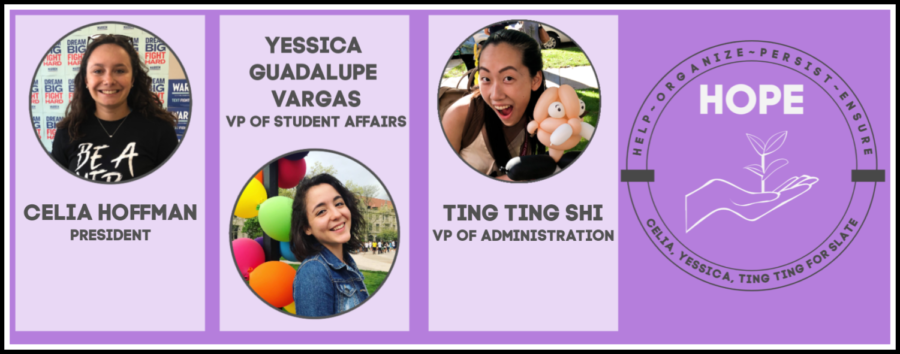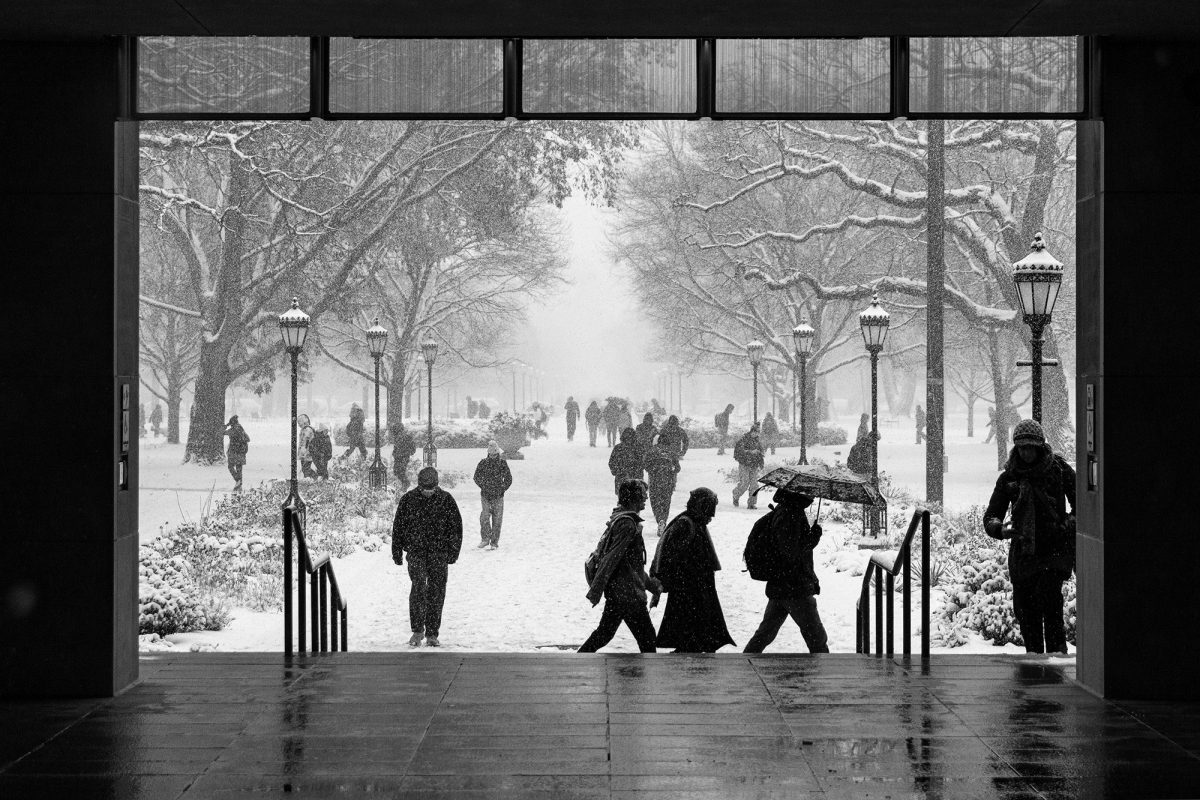On Friday, the HOPE Slate announced a write-in campaign for Student Government’s executive slate. The HOPE Slate includes third-year Celia Hoffman, running for president; third-year Yessica Guadalupe Vargas, running for vice president of student affairs; and second-year Ting Ting Shi, running for vice president of administration.
HOPE said that running for Student Government (SG) was not originally part of their college plans. They decided to run because they saw a need for “substantive and responsible” representation not met by the three other slates currently running.
HOPE’s campaign focuses on using the Student Government's position to raise the voices of student leaders and organizations. Each section of HOPE’s platform was developed in conversation with student organizations and past Student Government representatives from the CARE executive slate.
“We care about these issues from a deep personal place; we’re committed to centering activist and student needs in our administration,” Hoffman said. “We’re not just trying to check boxes; we’re committed to making real structural change.”
On COVID-19
In response to the impacts of COVID-19, HOPE plans to dedicate a portion of the Student Government’s fall quarter budget to the Emergency Fund if the fall quarter is online. Shi serves on the Emergency Fund’s finance board as its communications director, which she said has given her insight into students’ needs and the opportunity to provide financial assistance to both undergraduate and graduate students.
Hoffman emphasized the importance of prioritizing students’ health, safety, and well-being over intellectual rigor in their response to the coronavirus crisis and the possibility of a remote fall quarter. And, if UChicago returns to campus fall quarter, Hoffman said HOPE will be mindful of students with disabilities or immunodeficiencies.
“We want to recognize while coronavirus is something that’s certain to impact everyone, the most marginalized members of our community are facing the most impact of this,” Hoffman said.
HOPE is also committed to uniquely supporting international students impacted by virtual learning, pointing out that the majority of the University’s financial assistance goes toward domestic students.
On Sexual Assault and Misconduct
For Hoffman, a survivor of a sexual assault at UChicago, addressing sexual assault and misconduct on campus is “not just rhetoric” but a top priority of HOPE’s platform and her goals as president. “We need desperately to shift the paradigm on sexual violence on campus both in partnership with the administration and student advocates,” Hoffman said.
HOPE plans to implement mandatory sexual misconduct training for RSO’s, campus housing, and athletic groups. Central to their approach to sexual violence is reaching beyond campus to connect with community organizations such as Resilience and Porchlight, and work with the administration to establish a Rape Crisis Center in Hyde Park, which would be available to students and South Side neighbors.
HOPE also spoke with Phoenix Survivors Alliance while developing their platform about plans to cover sexual assault survivors’ legal fees under the purview of Student Government’s Sexual Assault Awareness and Prevention Committee, which both Hoffman and Shi have served on.
The slate sees a clear connection between Greek life and sexual misconduct. Through conversations with the administration and the Resources for Sexual Violence Prevention programming center, HOPE will demand the University recognizes Greek life to ensure fraternities are held responsible for infractions perpetrated in off-campus fraternity settings. As stated in their platform, HOPE plans to use “all tactics available, from discourse, to organizing, to protest, to going to the media so that we can enact change.” Additionally, Shi served as Vice President of Standards for her sorority Alpha Omicron Pi, a role in which she participated in discussions with the Sigma Chi and Psi Upsilon fraternities following incidents of sexual misconduct this year and organized risk meetings with other fraternities to discuss policy and prevention plans.
On Mental Health
One aspect of improving mental health on campus, Shi said, is increasing accessibility of information. HOPE plans to distribute a document that advertises mental health resources, explains the Student Counseling Service (SCS) intake process, and answers students’ frequently asked questions about mental health and support services.
Shi also emphasized a need not only to increase SCS case workers but to ensure that they represent and meet the specific needs of marginalized students.
Hoffman also emphasized the importance of providing intersectional, trauma-informed counseling, and care. Vargas also applauded CARE’s less formal mental health programming this past year which she hopes to continue to create enjoyable spaces where students can unwind.
On Diversity
Shi emphasized that HOPE’s goals for diversity are not just about promoting and maintaining diversity on campus but creating an inclusive culture.
HOPE has been in communication with the board of UChicago’s chapter of QuestBridge scholars to develop ways to best support first-generation and low-income students. The slate will also encourage the University to establish cultural centers and a comparative race and ethnic studies (CRES) Department by connecting student activist groups with administrators through town halls.
“We want to recognize [that] within the position of the executive slate we don’t always have the ability to make a CRES department or make a cultural center,” Shi said. “An action we can do as an executive slate that is important, [which] UC United relayed to us, is writing solidarity statements.”
The purpose of solidarity statements is to communicate on behalf of SG. “We’re here and we’re listening to you, and we are actively working to make sure that the administration also hears you,” Shi said.
On Sustainability
Currently, HOPE’s platform does not include plans to address sustainability on campus. However, the slate has reached out to Phoenix Sustainability Initiative to support and include those efforts in their platform.
“Our platform is very flexible and it’s changing to what the student body needs,” Shi said.
On Graduate Students United (GSU)
HOPE supports the efforts of GSU to gain recognition and bargaining rights from the University, which Hoffman said graduate students both need and deserve. The slate plans to hold quarterly meetings with GSU to maintain open communication between graduate students and Student Government.
Hoffman explained that two of the first things HOPE will do if elected are release a solidarity statement for GSU on behalf of Student Government and organize a town hall specifically focused on GSU. Additionally, HOPE said they will leverage the power of Student Government to try to schedule a formal meeting between GSU organizers and administrators.
On Communication With the Administration
To facilitate a strong relationship with the University, HOPE plans to expand upon CARE’s town halls with top administrators by coming to meetings with prepared agendas and data to share.
Shi explained that the current vice president of administration, fourth-year Brittney Dorton, shared insight into the disconnect between the University’s actions and student needs. “A lot of the people in the administration simply don’t have enough information on the issues that are really important to students,” Shi said.
“I think coming into meetings, being open and respectful of [administrators’] knowledge, and their roles, and understanding that they might not have all the information will be really important in maintaining a respectful relationship.”
On Engagement With the South Side and Surrounding Neighborhoods
For Vargas, who is from the South Side herself, addressing the “harmful and violent history” of UChicago’s role in the surrounding South Side neighborhoods is a priority. HOPE has spoken to UChicago United about developing a political education course to uncover this history and continuing the work of the Care Not Cops campaign to address the role of the UChicago Police Department in Hyde Park.
HOPE plans to build a relationship with the UChicago Labor Council to protect University workers in the South Side and surrounding neighborhoods. “We also want to emphasize leveraging the resources that UChicago has for the South Side community,” Vargas said.
Additionally, the slate plans to dedicate part of Student Government’s community service fund to host events between the University and South Side communities. To build pathways of communication, they also plan to put South Side leaders and community organizers in conversation with the University regarding its plans to develop into surrounding neighborhoods, such as the construction of the new Woodlawn dorms.
As a participant in the University’s Chicago Bound pre-orientation programming, Vargas hopes to encourage student engagement with the South Side and neighboring communities through house trips and a “comprehensive and culturally competent guide” to opportunities for exploring surrounding neighborhoods.








